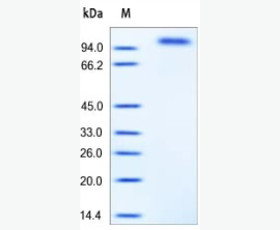Recombinant Human U6 snRNA-Associated Sm-Like Protein LSm1/LSM1
| Product name: | Recombinant Human U6 snRNA-Associated Sm-Like Protein LSm1/LSM1 |
| Source: | E.coli |
| Purity: | Greater than 95% as determined by reducing SDS-PAGE. |
| Buffer Formulation: | Lyophilized from a 0.2 μm filtered solution of 20mM PB, 150mM NaCl, pH 7.2. |
| Applications: | Applications:SDS-PAGE; WB; ELISA; IP. |
| Storage: | Avoid repeated freeze/thaw cycles. Store at 2-8 oC for one month. Aliquot and store at -80 oC for 12 months. |
| UOM: | 100ug/50ug/200ug/1mg/1g |
| Source | E.coli |
| Description | Recombinant Human LSM1 is produced by our E.coli expression system and the target gene encoding Met1-Tyr133 is expressed with a 6His tag at the C-terminus. |
| Names | U6 snRNA-Associated Sm-Like Protein LSm1, Cancer-Associated Sm-Like, Small Nuclear Ribonuclear CaSm, LSM1, CASM |
| Accession # | O15116 |
| Formulation | Lyophilized from a 0.2 μm filtered solution of 20mM PB, 150mM NaCl, pH 7.2. |
| Shipping |
The product is shipped at ambient temperature. |
| Reconstitution |
Always centrifuge tubes before opening. Do not mix by vortex or pipetting. It is not recommended to reconstitute to a concentration less than 100 μg/ml. Dissolve the lyophilized protein in ddH2O. Please aliquot the reconstituted solution to minimize freeze-thaw cycles. |
| Storage |
Lyophilized protein should be stored at < -20°C, though stable at room temperature for 3 weeks. Reconstituted protein solution can be stored at 4-7°C for 2-7 days. Aliquots of reconstituted samples are stable at < -20°C for 3 months. |
| Purity |
Greater than 95% as determined by reducing SDS-PAGE. |
| Endotoxin | Less than 0.1 ng/µg (1 IEU/µg) as determined by LAL test. |
| Amino Acid Sequence |
MNYMPGTASLIEDIDKKHLVLLRDGRTLIGFLRSIDQFANLVLHQTVERIHVGKKYGDIPRGIFV VRGENVVLLGEIDLEKESDTPLQQVSIEEILEEQRVEQQTKLEAEKLKVQALKDRGLSIPRADTL DEYVEHHHHHH
|
| Background | U6 snRNA-Associated Sm-Like Protein LSm1 (LSM1) belongs to the snRNP Sm proteins family. The Sm-like proteins are thought to form a stable heteromer present in tri-snRNP particles, which plays an important role in pre-mRNA splicing. LSM1 binds specifically to the 3-terminal U-tract of U6snRNA. LSM1 can interact with SLBP when histone mRNA is being rapidly degraded during the S phase. In addition, LSM1 is associated with cellular transformation and the progression of several malignancies including mesothelioma, lung cancer and breast cancer. |














